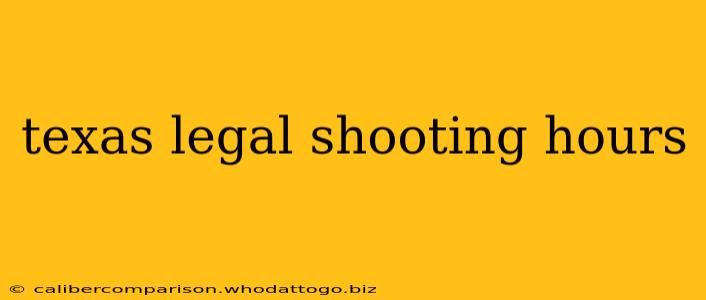Understanding Texas's legal shooting hours is crucial for responsible gun owners. While there isn't a statewide curfew specifically for shooting, various local ordinances and regulations significantly impact when and where you can legally discharge a firearm. This guide clarifies the complexities surrounding Texas shooting hours and helps ensure your activities remain within the bounds of the law.
The Absence of a Statewide Shooting Curfew
Texas doesn't have a state-level law dictating specific hours for shooting. This means there's no blanket "you can't shoot after 10 pm" rule across the entire state. However, this lack of statewide regulation doesn't equate to unrestricted shooting at any time or place. The legality hinges heavily on local ordinances and property rights.
Key Factors Determining Legal Shooting Hours
Several critical factors determine whether your shooting activity is legal in Texas:
1. Local Ordinances: The Primary Determinant
Municipal and county regulations are paramount. Many cities and counties have noise ordinances that restrict loud activities, including shooting, during specific hours. These ordinances vary greatly. Some might prohibit shooting after sunset, while others may have more lenient rules or specific exceptions for hunting or target practice on private property.
- Research is essential: Before engaging in any shooting activity, thoroughly research the specific ordinances of the city or county where you plan to shoot. Check your local government's website or contact them directly.
2. Property Ownership and Permission: Absolute Necessity
Regardless of local ordinances, shooting on private property requires the explicit permission of the landowner. Shooting on land you don't own, without permission, is trespassing and illegal. Even if local ordinances allow shooting at a particular time, you can still face legal consequences for shooting without consent on private land.
- Obtain written permission: Always get written permission from the landowner to avoid any misunderstandings or legal disputes.
3. State Laws Regarding Discharge of Firearms: Beyond Time Restrictions
Beyond the issue of hours, Texas has specific state laws concerning the safe and responsible discharge of firearms. These laws address:
- Safe handling practices: Improper handling, storage, and negligent discharge can lead to severe legal penalties.
- Specific locations: Discharging firearms near public roads, schools, or other populated areas is often strictly prohibited.
- Hunting regulations: Hunting seasons and regulations are also subject to state law and vary depending on the game and location.
How to Find Your Local Shooting Ordinances
To determine legal shooting hours in your specific location, follow these steps:
- Identify your city and county: Know the precise jurisdiction where you intend to shoot.
- Visit your local government website: Most city and county websites have a section dedicated to ordinances or codes. Search for keywords like "noise ordinance," "firearms," or "shooting."
- Contact your local authorities: If you can't find the information online, contact your city hall or county courthouse directly. They can provide clarity on local regulations.
Responsible Gun Ownership: Beyond the Legal Aspects
While understanding legal shooting hours is crucial, responsible gun ownership extends far beyond simply adhering to the letter of the law. Always prioritize safety, handle firearms responsibly, and respect the rights and safety of others.
Disclaimer: This information is intended for educational purposes only and does not constitute legal advice. Always consult with local authorities and legal professionals for specific guidance on firearms laws and regulations in your area.

